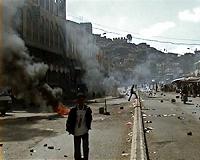| . |  |
. |
Cairo (UPI) Apr 29, 2010 An Egyptian state security court has convicted 26 men of plotting attacks for Hezbollah in what was widely seen as part of Tehran's clandestine effort to subvert the Arab Levant and North Africa, part of a larger regional struggle that has been steadily intensifying. But the absence of death sentences, which are de rigeur in such cases in which the security of totalitarian and paranoid Arab regimes are concerned, suggests that, for now at least, President Hosni Mubarak wants to avoid confrontation while seeking to undermine Tehran's leverage in the region. Still, the whole affair exposed the bitter struggle between Egypt, a U.S. ally, and Iran that has developed as Tehran sought to destabilize the so-called Arab moderates. They include Jordan and the North African states. At the time, Hezbollah was in the final phase of its campaign to dominate Lebanon, aided by Iran's sole Arab ally, Syria. Cairo has been at odds with the Tehran regime since the shah was toppled in 1979. Egypt gave the shah sanctuary when he fled into exile, something Tehran never forgot. This often deadly, Cold War-style struggle has received little attention in the West. But its latest manifestation, Israel's allegations that Syria had provided Hezbollah with Scud ballistic missiles capable of hitting anywhere in Israel, has brought it sharply into focus. The allegations sent already-high regional tension soaring amid deepening fears that a new war is brewing between Israel and Hezbollah, and possibly Syria as well. The six-month trial of the 26 defendants, including four in absentia, was a high-profile affair that provided a platform for Cairo to hurl verbal broadsides at Tehran and its wants to subvert and eventually dominate the region. It was to a large extent a show trial, intended to demonstrate Egyptian power and its intelligence capabilities, as well as impress Egyptians disgruntled with Mubarak's regime. It allowed Egypt to aspire to restoring its traditional status as the leader of the Arab world, a position largely taken over by Saudi Arabia in recent years, much to Mubarak's chagrin. The state prosecutors repeatedly accused Iran of being behind the plot to attack ships in the strategic Suez Canal, the maritime link between the Mediterranean and the Indian Ocean and vital for the U.S. military in wartime, as well as tourist resorts. It was never clear throughout the trial when the alleged attacks the Hezbollah cell was supposedly planning were to have taken place. Hezbollah leader Hassan Nasrallah took the unusual step of admitting that the organization had sent the network's key leader, a Lebanese named Sami Chechab, aka Mohammed Youssef Mansour, to Egypt to organize support -- weapons and explosives -- for the Palestinian Islamists of Hamas blockaded inside the Gaza Strip by Israel. Unrepentant, Nasrallah declared, "If aiding the Palestinians is a crime, I'm proud of it." Nasrallah denied any plans to subvert Egypt. But the Hezbollah operation was seen as part of an Iranian blueprint to undermine Egypt in advance of a possible war with the United States or Israel -- or both -- over Tehran's nuclear program. During a speech to army officers soon after the network was rounded up, Mubarak warned Iran, "Beware of the wrath of Egypt." Relations between Cairo and Hezbollah had plummeted after Egyptian security, reportedly alerted by Israel's intelligence service, launched its crackdown in November 2008. A month later, when Israel invaded Gaza to wage a 22-day war against Hamas, killing hundreds of civilians, Nasrallah called on Egyptians, including the army, to rise up against Mubarak for doing nothing to help the Palestinians. In Iran, a group affiliated with the Revolutionary Guards put a $1.5 million bounty on Mubarak's head for betraying the Palestinians. When the Egyptians finally went public on April 8, 2009, that the Hezbollah network had been rolled up, the announcement was accompanied by blistering condemnation of Hezbollah and Nasrallah for his unabashed admission he sent clandestine operatives into Egypt. The leading government daily al-Gomhuria vilified Nasrallah as "the monkey sheik" and "an ideological ally of al-Qaida." There is speculation Mubarak may release the Lebanese Cairo holds in a bid to restore relations with Nasrallah. Anything's possible in the Middle East, but Hezbollah's on a roll right now and may not want to play.
Share This Article With Planet Earth
Related Links
 Yemen: Secession drive becomes violent
Yemen: Secession drive becomes violentSanaa, Yemen (UPI) Apr 28, 2010 The southern secessionist movement appears to be gaining strength in the face of a heavy-handed crackdown by President Ali Abdullah Saleh. The separatists are responding by using increasingly more violent tactics, threatening to further weaken an already fragile regime that is struggling, with little success, to crush al-Qaida and avert an economic collapse. Several activists hav ... read more |
|
| The content herein, unless otherwise known to be public domain, are Copyright 1995-2010 - SpaceDaily. AFP and UPI Wire Stories are copyright Agence France-Presse and United Press International. ESA Portal Reports are copyright European Space Agency. All NASA sourced material is public domain. Additional copyrights may apply in whole or part to other bona fide parties. Advertising does not imply endorsement,agreement or approval of any opinions, statements or information provided by SpaceDaily on any Web page published or hosted by SpaceDaily. Privacy Statement |